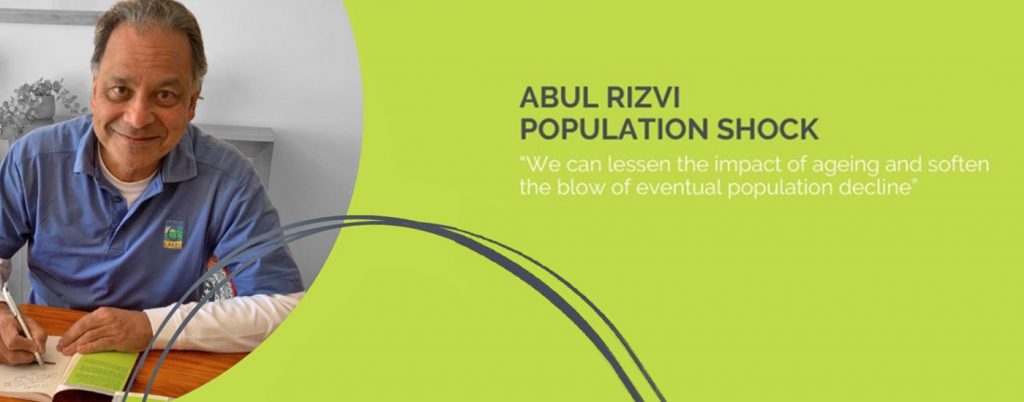Abul Rizvi is a retired academic living in Australia’s national capital, Canberra. He’s an expert in population ageing. But more than this, he is a hands-on practitioner, having actively managed Australia’s migration program between 1995-2007.
To say he knows a thing or two about population is an understatement.
Happily for the rest of us, he has distilled his nearly 30 years of experience and research into an 80-page volume, Population Shock.
I read it in a couple of hours this morning and am now sharing, as it raises important talking points for anyone concerned about how a decline in global population can be managed for the benefit of all.
Rizvi’s book talks largely to the Australian experience, but lessons here can apply anywhere.
He defines population ageing and decline to be one of the major challenges of the 21st Century – alongside climate change, geo-political volatility and possible future pandemics.
He describes four stages of population ageing – the boomers’ childhood, adulthood, ageing and finally when boomers die out. It’s a handy framework to better understand the relationship between population, economics and societal changes.
Where Rizvi gets really interesting is when he discusses the fourth stage – one typified by weak consumption and declining wage share of GDP. He highlights the consequences of this vis-a-vis greater wealth and income inequality (quoting Thomas Piketty in Capital) predicting inequality will grow faster. The Australian Government, Rizvi believes, is creating a false dichotomy between the choice of growing the economic pie versus better distributing it. These objectives do not have to be mutually exclusive, he believes.
But currently, he maintains, the owners of capital in Australia are receiving a ‘free kick’ with a favourable taxation regime for those who invest and a lack of an inheritance tax. The average inheritance tax across the OECD is 15%. Australia remains one of the few outliers with none whatsoever.
The two main challenges Rizvi leaves us with is how Australia can continue to import migrants at a fast enough rate to sustain the economy – whilst using migration as a political football on a regular basis. This will no doubt be tested in the ‘argey-bargey’ during the imminent federal election. Secondly, how to challenge the status quo of ever lower taxes for business and the wealthier sector of the population at the expense of the masses, which seems unlikely to change anytime soon.
Population Shock is a quick and easy read – but an important one. Australia has proudly promoted itself as one of the world’s most multicultural nations. But can it continue to attract younger workers when the rest of the ageing world is beckoning them as well?
Abul Rizvi
Population Shock
Monash University Publishing

